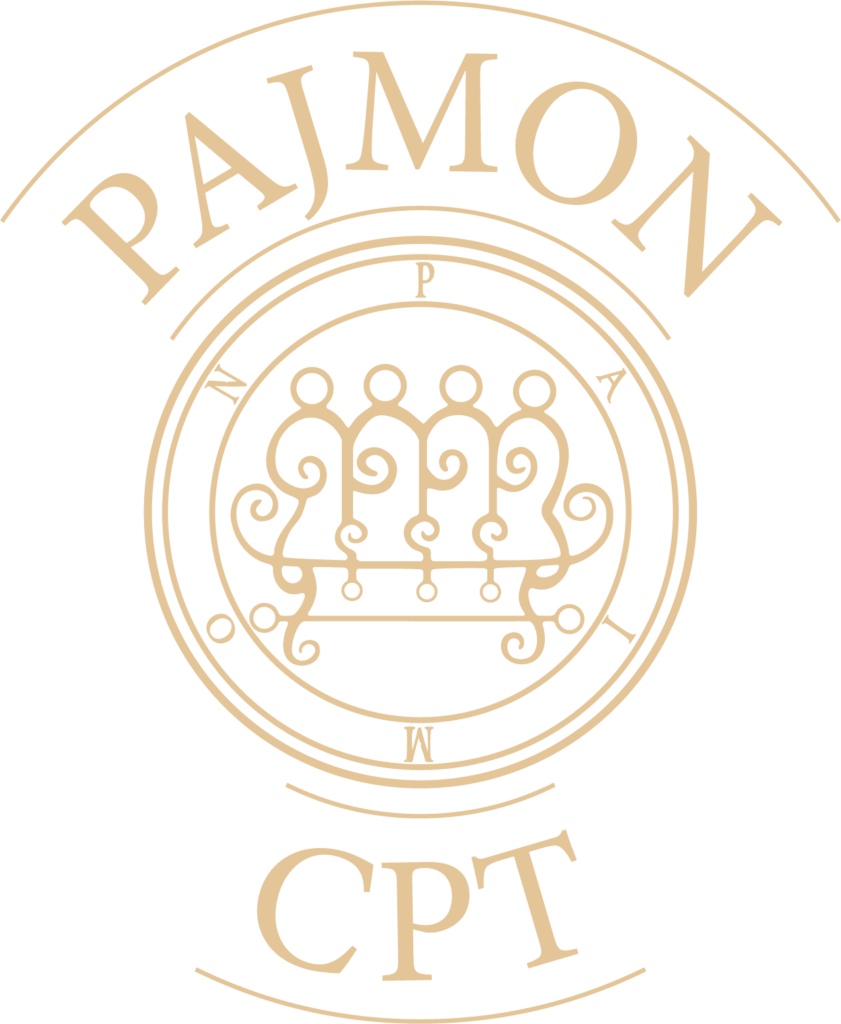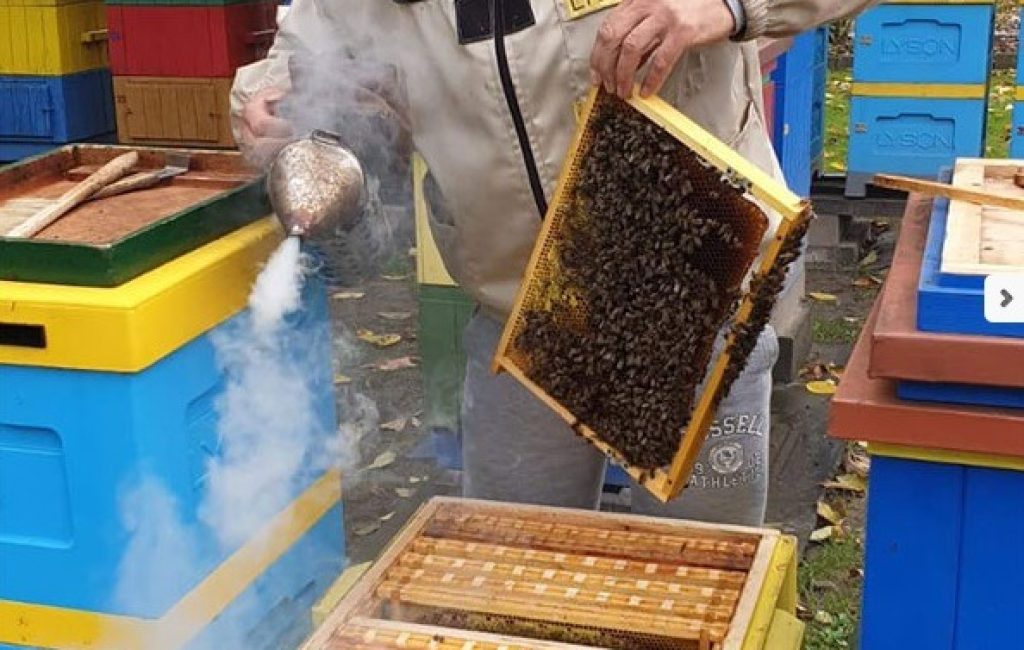Why is it worth saving bees, sowing flower meadows, introducing honey into your diet? Be sure to read the interview with Leszek Szweda, a beekeeper from Żory, who joins the #PajmondlaPlanety campaign following Euromot company from Żory. Together with Mr. Leszek, we will plant flower meadows in Żory this spring to ensure a friendly home and food for bees. Mr. Leszek even agreed to run a special beekeeping workshop. Oh, it is going to be fun! You can help too. Are you a private person, do you manage a company? Come to Pajmon CPT and save the bees with us! Call: 533 211 259 – Katarzyna Śleziona ‑ Kołek, Marketing and PR Director of Pajmon CPT.
Interview with Leszek Szweda, a beekeeper from Żory
Why did you become a beekeeper?
It all started 16 years ago on a holiday at a farm in Masuria. The owner of this farm had, among others, the apiary and encouraged guests to observe the honey harvesting that was taking place. It captivated me so much that I was returning to Żory with a set of books on beekeeping and with the thought that maybe one day I will have such an apiary myself. In the spring of the following year, I bought the first two bee hives that I set up in my garden. Soon after that, one of the beekeepers in Żory died and left behind 10 hives that had no one to look after. So I bought them and that’s how I started my adventure with beekeeping. During the first year of running the apiary, I was helped by Rudolf Dziwoki, a beekeeper from the Żory district of Rogoźno. In the following years, I gained experience in this activity and I managed to do it myself. This is still the case today and I am still improving.
Why are bees important in our lives?
Bees are important in our lives because they are pollinators – they pollinate plants while obtaining pollen and nectar. Thus, they provide food not only to us, but also to animals. The work of bees is the foundation of the ecosystem. Were it not for them, we would be threatened with starvation, because plants in the world simply would not bear fruit.
Is it worth sowing flower meadows?
It is definitely worth sowing them, for even their retention of water in the soil. Their existence is crucial for bees and other insects. Such a meadow becomes a natural home for them, it does not need to be sprayed with harmful herbicides, it does not require intensive watering, it prevents the soil from overheating, which is very important in the times of the climate crisis.
Please reveal some interesting facts about bees
Few people know that …
- in winter, each hive has more or less the same temperature, around 25 degrees Celsius;
- bees live in swarms, in one swarm there are from 30,000 to 50,000 bees;
- queen-bees can live up to 5 years; they lay about 2,000 eggs a day;
- an ordinary bee (worker) lives in the summer season from 4-6 weeks; bees that are born in August and September and enter the winter group live several months;
- bees need to visit about 4 million flowers to collect the nectar needed for 1 kilogram of honey;
- drones live from spring to autumn, and then they are driven out of the hive and destroyed by the bees;
- a strong family of 30,000 workers is able to bring 2 kilograms of honey to the hive per day;
- early flowering plants such as hazel, ivy and others nectar at temperatures above 15 degrees Celsius, and other plants – above 20 degrees Celsius; on the other hand, above plus 30 degrees Celsius, nectar disappears;
- as the only insect in the world, queen bees can make sounds through their mouths, in other insects we only hear the clang of wings.
Why should you include honey in your diet?
Honey has a beneficial effect on our immune and digestive systems – it supports metabolism, detoxifies the liver, calms down and helps to fall asleep. Honey enriches the diet with essential amino acids, simple sugars, microelements and vitamins. It is difficult to overestimate its properties, so it is worth consuming. Different varieties of honey help to heal other health problems.
What do bees produce besides honey?
After mixing pollen with honey, bee bread is formed – it is a natural vitamin bomb for humans, which greatly increases the body’s immunity. Alternatively, the nectar is processed into honey. These products, i.e. bee bread (protein food) and nectar – honey (sugar food), need bees to grow and feed new generations of bees. Propolis (a sticky resinous substance), which bees collect from trees, are carried to the hives, sealing their nest with it and covering its entire interior. Propolis protects the bee colony against bacteria, viruses, molds and fungi. For humans, when combined with alcohol, it is a natural antibiotic. Royal jelly, which the queen is fed in the hive – which can live up to about 5 years – is widely used in apitherapy (therapy of treatment with honey and other bee products) and in cosmetology. It is obtained by larger apiaries.
How do you think people approach the issue of setting up apiaries, producing honey, saving bees or planting flower meadows? Are they open to such initiatives?
Unfortunately, they are not. Bee care is knowledge-intensive and labor-intensive. People who want to have their apiary do not realize that. Work in the apiary lasts all year round! Despite the initial good intentions, many cannot cope with running an apiary and give up this occupation.
At every opportunity, I inform and encourage you to plant plants, shrubs and honey trees as well as flower meadows in your gardens. Here it is necessary to emphasize significant progress and a positive attitude. I am also observing a significant increase in interest in bee products: bee pollen, bee bread, propolis and varietal honeys.
Today, the customer of the apiary has more knowledge about bee products and can appreciate the year-round work of the beekeeper and his honesty by paying the right price for honey. This is the case in my apiary “Pyszny miodek” from Żory – it’s 100 percent honesty, 100 percent satisfaction, 100 percent joy. I also invite you to visit the website: pysznymiodek.pl.
—–
Pajmon CPT specializes in delegating temporary and permanent workers to work, mainly from Ukraine, but also from: Belarus, Russia, Moldova and India. CPT employees are praised for their reliability, diligence and skills. They are proven professionals for every budget. There are approximately 4,500 candidates in the company’s database. Among them are qualified employees for various industries, including: food, chemical, metallurgical, fuel and energy, construction and many others. The Pajmon company deals with: outsourcing of services, employee outsourcing and employee leasing.
—–
Do you want to learn more about the benefits of working with Pajmon CPT sp.z o.o.? Information is provided by: Monika Cieślik, Management Board Office Assistant from Pajmon CPT, phone: 790 570 880, e-mail: monika.cieslik@pajmon.com.pl





